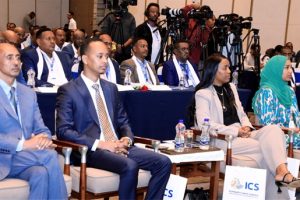
Ethiopia launched the “Homegrown Economic Reform” in the sectoral, structural and macro-economic areas aiming to minimize debt burden, adjust imbalance of import-export trade as well as to mobilize domestic resource.
While introducing its three years of economic reform, Ethiopia announced it needs 10 billion USD which would be generated from both domestic and international development partners. Since the onset of homegrown economic reform plan, multilateral organizations such as International Monetary Fund (IMF), World Bank (WB), and Saudi Development Fund (SDF) have given immediate response to the call by pledging to support Ethiopia’s reform measures in the form of loan and grant.
Accordingly, The Executive Board of IMF approved 2.9 billion USD in a bid to back the implementation of Homegrown Economic Reform Plan and maintain macroeconomic stability. The Board’s decision will enable an immediate disbursement about 308.4 million USD, as to IMF report.
Saudi Development Fund for (SDF) is also pledged to provide 140 million USD loan in order to assist development projects. Economists suggest that unless the nation invests the loan and grant in key priority areas and thereby increase foreign currency earnings, the debt burden will exceed.
Dr. Atelaw Alemu, Economist at Addis Ababa University told The Ethiopian Herald that the loan and financial assistance would have positive and negative impact depending on its utilization. He said: “If we utilize the loan wisely, it would be a blessing. As it is a capital, it would have positive impact in increasing the flow of investment and creating more jobs.
The most imperative point that should be underlined here is, loan utilization. But, no one propose the loan and grant is not indispensable for a country like Ethiopia to up the economy. The threat comes in when considering country’s previous experience. This triggers us to raise one pertinent inquiry.
How can the state utilize the loan is the question that maters, Dr. Atlaw says . In this regard, the government should be transparent for the public coming up with priority areas that the loan will be expend on. Unless invested in key priority areas which enable the country to return the loan faster, it would fall into debt crisis, he adds.
“If there is no financial leakage, the loan can return easily. However, gaining loan and financial assistance is a blessing, if we utilize the loan efficiently and effectively. Otherwise, if the loan is taken as a capital flight and stored at foreign banks by corrupters, with no doubt, it would elevate the debt burden than ever before.”
Dr. Atlaw suggests that, if the loan is properly utilized in creating more jobs by identifying key priority areas, the number of unemployed citizens will dramatically reduce. And the country will be able to produce exported products that have immense contribution to increase foreign currency gain as well as expand basic infrastructure developments, he states.
Wosenseged Assefa, an Economist on his part says, the country is getting loan from giant multilateral institutions such as IMF, World Bank and so on. When multilateral institutions allow countries to take loan, they need to get something in return. In short, they require countries to alter their policy. The same thing has happened in the Ethiopia’s case, Wosenseged says adding that before IMF allows loan for Ethiopia, it puts conditions to be fulfilled first. One is, the dollar exchange rate should be judged by the market force. Accordingly, Ethiopia has signed to do so.
As to him, the very problem here is, the dollar exchange rate is getting depreciated while it has decided by market value. As the exchange rate increasing, the value of birr diminishing and the people cannot able to purchase whatever they wish as Ethiopians are highly dependent on imported goods, Wosenseged says indicating that the nation has imported13 billion USD worth goods and exported three billion USD goods and services.
Wosenseged says the demand of dollar is now high; however, the supply is not equivalent to the demand. In this case, the rate of inflation escalating as the value of dollar is getting elevated. Accordingly, the state of being rapacious will also arise. With this, the average income earners will not be able to get foods. As a result, the government falls into range of difficulties and the country will expose to social unrest, he says.
Secondly, as the value of dollar is rising, developing countries will have a chance to buy home grown products with discounted price he says adding that due to this the economic reform will fall into troubles. And again, the country will stretch hands to get additional loan from multilateral financial institutions. ”Finally, we will fall into debt burden crises and engage in huge economic crisis as Latin American countries.”
The culture of embezzlement among government officials in Ethiopia over the past years made loan providing institutions reluctant to lend hands. Hence, at this critical juncture, IMF is the lonely multilateral financial institutions available to provide loan for Ethiopia, he said.
He suggests that, the country need to get assistance of the Diaspora community, finalize renaissance dam and export power to intensify foreign currency earnings. Similarly the recently launched satellite would have considerable impact on the economy. What is more, states men are urged to stabilize the demand for foreign currency. Then, the price of local items will also be stabilized.
“Increase number of investors, coordinate the Diaspora or enforce them to come home with a span of seven years as Indians do is critical. The country has to get increase amount of dollar by force or willingness of the Diaspora. The best option is encourage the Diaspora to integrate and invest in Ethiopia, he concludes.
The Ethiopian Herald, December 26/2019
BY GIRMACHEW GASHAW





